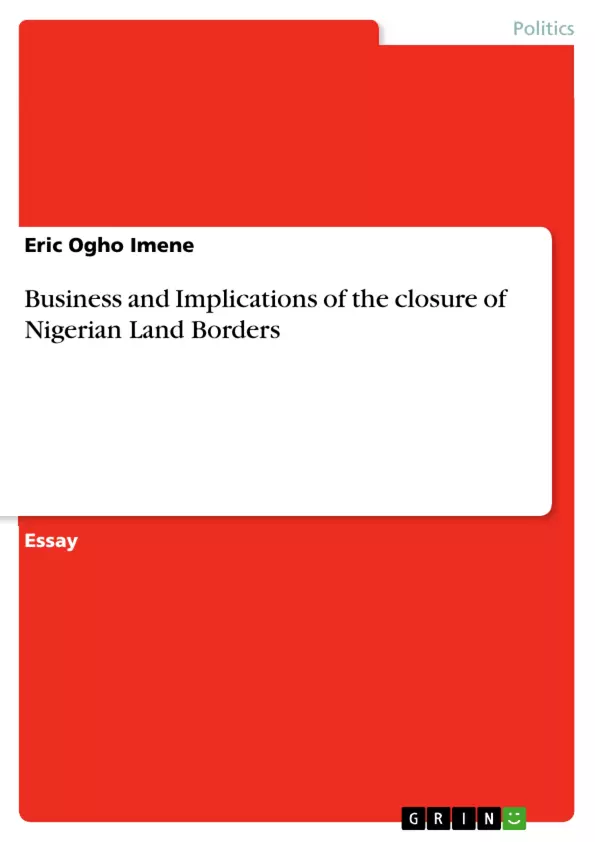The paper is about the closure of Nigerian land borders. The partial closure of the national borders of Nigeria on 20 August 2019 came as a rude shock and an economic aberration to the regional neighbors of Nigeria which is the commercial hub of surrounding countries. The irony of this is that the government of Nigeria started a visa-free policy for Africans from January 2020. Could borders be effectively closed for goods and services when human movements with its attendant risk factors are encouraged? For security reasons, countries like Rwanda, Kenya, Sudan and Eritrea had previously closed their borders. Borders have also been closed as a way of forestalling the spread of epidemics such as the dreaded Ebola.
Inhaltsverzeichnis (Table of Contents)
- The only true borders lie between day and night, between life and death, between hope and loss.
- The partial closure of the national borders of Nigeria on 20 August 2019 came as a rude shock and an economic aberration to the regional neighbors of Nigeria which is the commercial hub of surrounding countries.
- The irony of this is that the government of Nigeria started a visa-free policy for Africans from January 2020.
- Nigeria has four main borders with Cameroun in its southern part of Cross River; with Chad in North-East and Niger in the North.
- The border closure is inconsistent with the agreement which led to the formation of the Economic Community of West African States ECOWAS, which has the sole aim of practicing a "free trade area".
- According to the Nigerian government, the drastic action of President Muhammadu Buhari was simply targeted at the suspension of imports and exports across all of Nigeria's land borders with the aim of alleviating rampant smuggling and the entrance of security risk factors.
- It is believed that the border closure is the most aggressive in a series of policies ever introduced by the government of President Muhammadu Buhari.
- Statistics shows that the Republic of Benin imports 1.2 million metric tons of rice annually with a population of around 11 million people.
- Prior to the closure of borders, the government of Nigeria had previously placed ban on some products in order to stimulate local production.
Zielsetzung und Themenschwerpunkte (Objectives and Key Themes)
This document examines the implications of the partial closure of Nigeria's land borders in August 2019, focusing on its impact on regional trade and the Nigerian economy. It explores the rationale behind the closure, the economic and social consequences, and the broader context of regional integration and free trade agreements.
- The impact of border closure on regional trade and economic integration.
- The effectiveness of border closure as a strategy to combat smuggling and insecurity.
- The economic consequences of border closure for Nigeria, including inflation, unemployment, and the availability of goods.
- The need for regional cooperation and enforcement of free trade agreements within ECOWAS.
- The role of government policies in stimulating local production and diversifying the Nigerian economy.
Zusammenfassung der Kapitel (Chapter Summaries)
- The first chapter discusses the background of the border closure, highlighting the context of regional trade and the existing free trade agreements. It also explores the government's rationale for the closure, which was primarily focused on curbing smuggling and improving security.
- The second chapter delves into the economic consequences of the border closure. It analyzes the impact on inflation, unemployment, and the availability of goods, particularly food items. The chapter also examines the challenges faced by businesses and individuals reliant on cross-border trade.
- The third chapter explores the broader implications of the border closure on regional integration and the implementation of free trade agreements. It discusses the need for improved border management and the importance of cooperation among ECOWAS member states. The chapter also highlights the potential for the closure to stimulate local production and enhance food security.
Schlüsselwörter (Keywords)
The key themes and concepts explored in this document include border closure, regional trade, economic integration, smuggling, security, inflation, unemployment, ECOWAS, free trade agreements, local production, diversification, and government policy.
Frequently Asked Questions
Why did Nigeria partially close its land borders in August 2019?
The closure aimed to curb rampant smuggling (especially of rice) and to improve national security by preventing the entry of illegal goods and security risks.
What are the economic consequences of Nigeria's border closure?
The closure led to significant inflation, particularly in food prices, and caused economic disruptions for regional neighbors like Benin and Niger.
How does the border closure affect the ECOWAS free trade agreement?
Critics argue the closure is inconsistent with ECOWAS principles, which aim to establish a free trade area and promote regional economic integration.
What is the irony regarding Nigeria's visa policy during the closure?
While land borders were closed for goods, the government simultaneously introduced a visa-free policy for Africans, creating a contradiction between human movement and trade restrictions.
Did the closure help local production in Nigeria?
The government intended the closure to stimulate local industries and diversify the economy, though the immediate effect was often higher prices for consumers.
- Arbeit zitieren
- Eric Ogho Imene (Autor:in), 2019, Business and Implications of the closure of Nigerian Land Borders, München, GRIN Verlag, https://www.grin.com/document/513615



